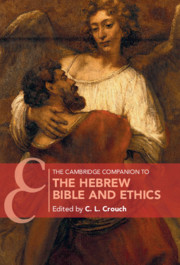Book contents
- The Cambridge Companion to the Hebrew Bible and Ethics
- Cambridge Companions to Religion
- The Cambridge Companion to the Hebrew Bible and Ethics
- Copyright page
- Dedication
- Contents
- Notes on Contributors
- Introduction
- Part I Legal Ethics
- 1 The Decalogue
- 2 The Talionic Principle and Its Calibrations
- 3 Community Violence in Deuteronomy
- 4 The Construction of Gender Roles in the Book of the Covenant and in Deuteronomy
- 5 Economics and the Law
- Part II Narrative Ethics
- Part III Prophetic Ethics
- Part IV Wisdom/Poetic Ethics
- Part V Faithful Ethics
- Index
- Cambridge Companions to Religion (continued from page iii)
- References
1 - The Decalogue
An Icon of Ethical Discourse
from Part I - Legal Ethics
Published online by Cambridge University Press: 05 February 2021
- The Cambridge Companion to the Hebrew Bible and Ethics
- Cambridge Companions to Religion
- The Cambridge Companion to the Hebrew Bible and Ethics
- Copyright page
- Dedication
- Contents
- Notes on Contributors
- Introduction
- Part I Legal Ethics
- 1 The Decalogue
- 2 The Talionic Principle and Its Calibrations
- 3 Community Violence in Deuteronomy
- 4 The Construction of Gender Roles in the Book of the Covenant and in Deuteronomy
- 5 Economics and the Law
- Part II Narrative Ethics
- Part III Prophetic Ethics
- Part IV Wisdom/Poetic Ethics
- Part V Faithful Ethics
- Index
- Cambridge Companions to Religion (continued from page iii)
- References
Summary
Thus speaks Moses at the culmination of Thomas Mann’s The Tables of the Law, written in 1943. Mann’s use of the Ten Commandments in his “antifascist manifesto” is a token of the Decalogue’s symbolic role in discourses on ethical foundations in cultures that have been influenced by Judaism and Christianity. While the quest for the origin and redactional development of the Decalogue’s two versions in Exodus 20 and Deuteronomy 5 has been the focus of much exegetical work, these genetic questions are of limited relevance for understanding the Ten Commandments’ ethical significance. I shall, therefore, concentrate here on some fundamental literary features of this text in its canonical contexts and its vast history of reception. Against this background, I shall consider the Decalogue as an icon of ethical discourse, which poses significant questions for contemporary ethical reflection.
- Type
- Chapter
- Information
- Publisher: Cambridge University PressPrint publication year: 2021
References
Further Reading
- 1
- Cited by

